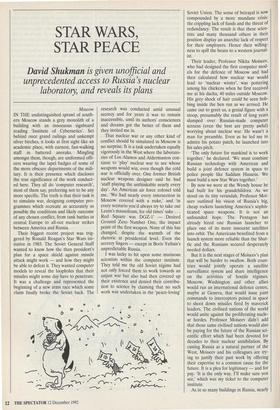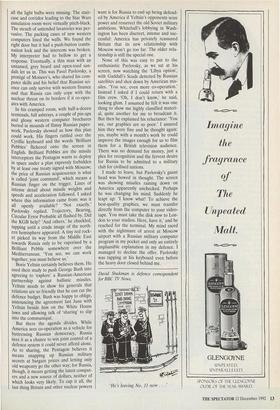STAR WARS, STAR PEACE
David Shukman is given unofficial and unprecedented access to Russia's nuclear laboratory, and reveals its plans Moscow IN THE undistinguished sprawl of south- ern Moscow stands a grey monolith of a building with an innocuous signboard reading 'Institute of Cybernetics'. Set behind once grand railings and unkempt silver birches, it looks at first sight like an academic place, with earnest, fast-walking staff in battered anoraks. Mingling amongst them, though, are uniformed offi- cers wearing the lapel badges of some of the more obscure departments of the mili- tary. It is their presence which discloses the true significance of the work conduct- ed here. They all do 'computer research', most of them say, preferring not to be any more specific. The truth is that their task is to simulate war, designing computer pro- grammes which recreate as accurately as possible the conditions and likely outcome of any chosen conflict, from tank battles in central Europe to all-out nuclear strikes between America and Russia.
Their biggest recent project was trig- gered by Ronald Reagan's Star Wars ini- tiative in 1983. The Soviet General Staff wanted to know how the then president's plan for a space shield against missile attack might work — and how they might be able to defeat it. They wanted computer models to reveal the loopholes that their missiles might some day have to penetrate. It was a challenge and represented the beginning of a new arms race which some claim finally broke the Soviet back. The research was conducted amid unusual secrecy and for years it was to remain inaccessible, until its authors' consciences and dreams got the better of them and they invited me in.
That nuclear war or any other kind of conflict should be simulated in Moscow is no surprise. It is a task undertaken equally vigorously in the West where the laborato- ries of Los Alamos and Aldermaston con- tinue to 'play' nuclear war to see whose weapons would win, even though the cold war is officially over. One former British nuclear weapons designer said he had `staff playing the unthinkable nearly every day'. An American air force colonel told me, 'We had nearly every intersection in Moscow covered with a nuke,' and 'in every scenario you'd always try to take out Lenin's mausoleum, for old times' sake . . . Red Square was DGZ-1' — Desired Ground Zero Number One, the impact point of the first weapon. None of this has changed, despite the warmth of the rhetoric at presidential level. Even the secrecy lingers — except in Boris Yeltsin's unpredictable Russia.
I was lucky to hit upon some mutinous scientists within the computer institute. They told me the old Soviet regime had not only forced them to work towards an unjust war but also had then covered up their existence and denied their contribu- tion to science by claiming that no such work was undertaken in the 'peace-loving' Soviet Union. The sense of betrayal is now compounded by a more mundane crisis: the crippling lack of funds and the threat of redundancy. The result is that these scien- tists and many thousand others in their position display an anarchic lack of respect for their employers. Hence their willing- ness to spill the beans to a western journal- ist.
Their leader, Professor Nikita Moiseev, who had designed the first computer mod- els for the defence of Moscow and had then calculated how nuclear war would lead to 'nuclear winter', was pottering among his chickens when he first received me at his dacha, 40 miles outside Moscow. His grey shock of hair could be seen bob- bing inside the hen run as we arrived. He came out to greet us, a genial figure with a stoop, presumably the result of long years slumped over Russian-made computer screens (even the best are pretty awful) worrying about nuclear war. He wasn't a man for preamble. Even as he led me to admire his potato patch, he launched into his sales pitch.
The only future for mankind is to work together,' he declared. 'We must combine Russian technology with American and build a joint defence system in space to police people like Saddam Hussein. We must build a new Star Wars together.'
By now we were at the Wendy house he had built for his grandchildren. As we stood on its tiny verandah, Professor Moi- seev outlined his vision of Russia's big, cheap rockets launching America's sophis- ticated space weapons. It is not an unfounded hope. The Pentagon has already hired one Russian launcher to place one of its more innocent satellites into orbit. The Americans benefited from a launch system more reliable than the Shut- tle and the Russians secured desperately needed dollars.
But it is the next stages of Moiseev's plan that will be harder to swallow. Both coun- tries would jointly operate a satellite surveillance system and share intelligence on the activities of hostile regimes. Moscow, Washington and other allies would run an international defence centre, maybe at Geneva, that would issue joint commands to interceptors poised in space to shoot down missiles fired by maverick leaders. The civilised nations of the world would unite against the proliferating nucle- ar hordes. Professor Moiseev didn't add that those same civilised nations would also be paying for the future of the Russian sci- entific effort which had been devoted for decades to their nuclear annihilation. By casting Russia as a natural partner of the West, Moiseev and his colleagues are try- ing to justify their past work by offering their expertise to a common cause for the future. It is a plea for legitimacy — and for pay. 'It is the only way. I'll make sure you see,' which was my ticket to the computer institute.
As in so many buildings in Russia, nearly all the light bulbs were missing. The stair- case and corridor leading to the Star Wars simulation room were virtually pitch-black. The stench of untended lavatories was per- vasive. The packing cases of new western computers lined the walls. We found the right door but it had a push-button combi- nation lock and the intercom was broken. My interpreter had to bellow to get a response. Eventually, a thin man with an untamed, grey beard and open-toed san- dals let us in. This was Pavel Pavlovsky, a protégé of Moiseev's, who shared his com- puter skills and his belief that Russian sci- ence can only survive with western finance and that Russia can only cope with the nuclear threat on its borders if it co-oper- ates with America.
In his cramped room, with half-a-dozen terminals, full ashtrays, a couple of pin-ups and glossy western computer brochures buried in mounds of flimsy Russian paper- work, Pavlovsky showed us how this plan could work. His fingers rattled over the Cyrillic keyboard and the words 'Brilliant Pebbles' flickered onto the screen in English. Brilliant Pebbles are the missile interceptors the Pentagon wants to deploy in space under a plan expressly forbidden by at least one treaty signed with Moscow; the price of Russian acquiescence is what is called 'joint command', which means a Russian finger on the trigger. Lines of intense detail about missile weights and speeds and acceleration followed. I asked where this information came from: was it all openly available? 'Not exactly,' Pavlovsky replied. Trajectory, Bearing, Circular Error Probable all flashed by. Did the KGB help? 'And others,' he chuckled, tapping until a crude image of the north- ern hemisphere appeared. A tiny red rock- et picked its way from the Middle East towards Russia only to be vaporised by a Brilliant Pebble somewhere over the Mediterranean. 'You see, we can work together; you must believe us.' Boris Yeltsin certainly believes them. He used their study to push George Bush into agreeing to 'explore' a Russian-American partnership against ballistic missiles. Yeltsin needs to show his generals that relations are so friendly that he can cut the defence budget. Bush was happy to oblige, announcing the agreement last June with Yeltsin beside him on the White House lawn and allowing talk of 'sharing' to slip into the communiqué. But there the agenda divides. While America sees co-operation as a vehicle for buttressing Russian democracy, Russia sees it as a chance to win joint control of a defence system it could never afford alone. As to sharing, the Pentagon believes it means snapping up Russian military secrets at bargain prices and letting only old weaponry go the other way; for Russia, though, it means getting the latest comput- ers and a new source of dollars, neither of which looks very likely. To cap it all, the last thing Britain and other nuclear powers want is for Russia to end up being defend- ed by America if Yeltsin's opponents seize power and resurrect the old Soviet military ambitions. Whitehall's lobbying in Wash- ington has been discreet, intense and suc- cessful: America has privately reassured Britain that its new relationship with Moscow won't go too far. The older rela- tionship is still the special one.
None of this was easy to put to the enthusiastic Pavlovsky, as we sat at his screen, now watching the 'Libya option', with Gaddafi's Scuds detected by Russian satellites and shot down by American mis- siles. 'You see, even more co-operation.' Instead I asked if I could return with a film crew. 'Oh, I don't know,' he said, looking glum. I assumed he felt it was one thing to show me highly classified materi- al, quite another for me to broadcast it. But then he explained his reluctance: 'You see, our graphics are so poor.' I assured him they were fine and he thought again: yes, maybe with a month's work he could improve the images enough for us to film them for a British television audience. There was no demand for money, just a plea for recognition and the fervent desire for Russia to be admitted to a military club for civilised nations.
I made to leave, but Pavlovsky's gaunt head was bowed in thought. The screen was showing missiles raining down on America apparently unchecked. Perhaps he was changing his mind. Suddenly he leapt up: 'I know what! To achieve the best-quality graphics, we must transfer directly from the computer to your video- tape. You must take the disk now to Lon- don to your studios. Here, have it,' and he reached for the terminal. My mind raced with the nightmare of arrest at Moscow airport with a Russian military computer program in my pocket and only an entirely implausible explanation in my defence. I managed to decline the offer. Pavlovsky was tapping at his keyboard even before the heavy door closed behind me.
David Shukman is defence correspondent for BBC TV News.
'He's leaving No. 11 now . .



































































 Previous page
Previous page